 By Graziella DiNuzzo I sat down with Stephen Anderson, Founder of Marquis Advisory Group and newest member of the World Trade Center of Greater Philadelphia, to learn more about his history and how Marquis came into existence. In October 1961, you were able to walk into The New York Times lobby on 43rd street in Manhattan and ask for directions to the Human Resources Department. And over the Christmas holiday, when you were at home in Jamestown, New York with your parents, you received a telegram asking you to report to work as a journalist in training. How did you manage that? "I am not sure. My journalism experience was limited to my college newspaper and The Chautauqua Daily, a paper of Chautauqua Institution in western New York State. Once at the Times my part was not important. What I could do now was on-the-job training that was semi-structured, informal, but with great mentors." So, what made you want to be a journalist? "My great uncle laid the idea in my mind. He was a lawyer, but never talked to me about law. His favorite recollections were about being a young journalist for the Jamestown Post Journal in Jamestown, New York, where we lived, and a free-lance journalist for the Canadian Pacific news. Great stories, including being sent to Panama to report on the unfinished Panama Canal. He was maybe 20 years old." It's certain that curiosity to find the truth and the courage to tell it are in Anderson's blood. "After working at the Times for three years, the Guild, the journalist's union, went on strike. McGraw-Hill, the publishing company on 42nd street at the time, was hiring. I landed a job there, assigned to covering emerging technologies, like Xerox, RCA, and others like TelePrompter. In one article I compared TelePrompter and Lear, who were competing in the reel-to-reel tape cartridge player for automobiles. Inadvertently my article suggested an alternative strategy for the auto display target. A few days later, TelePrompter asked if I would join their division responsible for the tape player. And my wife and I moved from Manhattan to Southern New Jersey. " Following his position at TelePrompter, Anderson held executive management positions which two Fortune 500 companies based in Philadelphia, (ESB Incorporated and Westmoreland Coal Company) both of whom have subsequently been acquired. His roles in both organizations were working with senior management on strategy and increasing share price. "ESB had global reach, manufacturing and recognized brands in Ray-O-Vac and Exide batteries. But in the 1970s batteries were not exciting to the investment community. We focused on the future. Developed battery powered cars and buses and tested them for two years. We got the attention of Polaroid and developed the battery imbedded in every Polaroid film pack. We focused on the application of batteries for the medical market, and it worked. ESB was purchased by a Canadian company for a price per share significantly greater than market." It was with Westmoreland where Anderson was most challenged. "I was asked to come in and help with their share price. But in order to do that I saw they needed a lot of changes internally. Fortunately, I had the backing of the Chairman. Traditional labor practices with the United Mine Workers were a problem. Changing the management tradition of an established industry gave resistance." Anderson also helped Westmoreland start a mobile book program with West Virginia's library to bring books to children and adults, and reading programs to isolated villages. He also helped facilitate Westmoreland grants to West Virginia colleges and universities for environmental research, and also sponsored morning children's TV shows in regions where Westmoreland had employees in Virginia, West Virginia, Colorado, and Montana. 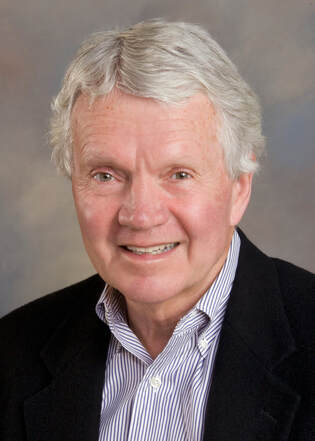 Stephen Anderson, Founder of Marquis Advisory Group Stephen Anderson, Founder of Marquis Advisory Group And then a deadly explosion occurred. Five miners were killed in a Westmoreland mine in West Virginia. 'I flew down to manage the press that were showing up at the scene of the explosion. We held updates every three hours for 48 hours until the bodies were recovered. Then, an NBC TV reporter asked," Who is responsible for the explosion?" I had anticipated this question and asked it very quickly saying that management is responsible. Well, all the camera lights went out and every newspaper and TV reporter ran to their offices and phones. When I returned to Philadelphia the next morning, our attorney stood at my office door and started reaming me for my statement. Behind him stood the Chairman, who tapped the attorney on the shoulder and said, "Steve did the right thing. If you cannot handle it. I will get someone who can." Subsequently, after attending a lecture by Edward Deming during an MBA course at University of Pennsylvania, Steve instituted Deming's principles, later branded as Six Sigma, at Westmoreland. Originally created by an American engineer, Bill Smith at Motorola, it basically, is a process in which 99.99966% of all opportunities to produce some feature of a part are statistically expected to be free of defects. Westmoreland trained all of its employees, including the miners. A major outcome, in addition to the miners and their bosses collaborating, was an independent contract negotiated by the President of Westmoreland, Chris Seglem. In 1993, Steve and his wife moved to San Francisco and established his consulting practice, originally branded as Six Sigma Group and later changed to Marquis Advisory Group. Drawing on his wealth of knowledge, Anderson understood that the key to a successful consulting company is to bring a highly specialized team of professionals together to provide companies customized, innovative, growth-oriented strategies for success. Silicon Valley Bank (SVB) was Anderson's first client. "Silicon Valley Bank was founded on the need for the investors in startups, the venture capitalists, to have a reliable bank that understood early-stage businesses. We were brought in to help the bank improve shareholder confidence, retain customers, and use the concepts of Six Sigma to make the bank's administration as close to 100% accurate and functionally perfection as possible." Marquis' first international client was an Australian cancer research laboratory that was publicly traded on both Australia's ASX and U.S. Nasdaq. Today, Marquis clients have included a Singapore manufacturer of miniature motors and controllers used to manufacture computer chips, medical equipment, a Silicon Valley pioneer in Internet consumer communications and an Indonesian seafood exporting company and a precious metals mining company based in South Africa. Since returning to Philadelphia in 2020, Anderson reconnected into a business region he had known but lost touch with while on the West Coast. In 2021 Peter Longstreth, President of the Consular Corps Association of Philadelphia, recommended to Wilfred Muskens to join Marquis. Muskens is the Honorary Consul in Philadelphia for the Kingdom of the Netherlands, and U.S. Trade Representative for Kutch Region, State of Gujarat, India. Jerry Sorkin, Consulate of Tunisia in Philadelphia has also joined Marquis this year. When I asked Wilfred, a member of WTC, why he selected Marquis he responded, “I was looking for a professional environment where I would be able to work with a diverse group of experts on a project-by-project basis, while remaining independent. Marquis Advisory allows me to bring an exceptional set of skills to the table when meeting with potential clients.” Marquis has also entered a “partnership-affiliation” with the Philadelphia headquartered, internationally respected economic research firm, Econsult Solutions Inc. (ESI) and will close on a similar agreement with Mindhive Pty Ltd, a Brisbane, Australia firm that is considered a leading analytical software for crowd sourced, online platform research data development. “These partnership-affiliations provide our clients with the most advanced research service and the leading provider of information via cloud sourcing,” says Anderson. In addition to his responsibility to lead Marquis, Anderson serves as chairman of an IT AI company, Insight Systems Inc. that enables large organizations like the U.S. Department of Energy, to control contracts and manage budgets on a very timely basis. https://www.marquisadvisory.com
1 Comment
By Graziella DiNuzzo Fred Winter recalls living in tents and trailers in various South African countries like Angola, Congo, Mozambique, Namibia, Zambia, Zimbabwe, and of course South Africa as the most developed and richest mining country with many other mining engineers from all over Europe. “I was recruited by the South African Bureau of Mines who did exploration work for the largest mining corporation in the world like Anglo-American, Anglo Vaal, BHP, Rio Tinto etc. After a number of years I was hired by Siemens AG to sell electro equipment to the various mining companies. I left my home in Germany as a young man to work alongside miners who excavated metal, minerals and concentrates from open pit and underground mines. We worked down in the mines for minerals about 2 miles underground. The most interesting mines were the platinum mines on the Highveld which are up to more than 1.5 miles underground. It was an interesting and volatile time, but I got along well with the miners from all over the world and the predominant local work force.” As a newly arrived immigrant in the U.S., Fred continued his career as a geologist and engineer and would one day stumble upon an opportunity. He attended an auction in 1983 and bought the assets of a metal processing company in Camden, New Jersey and started F.W. Winter Inc. & Co. FW Winter in the 1990s. Today, F.W Winter, Inc. & Co. is the leading industry supplier of metal and alloys in powder and lump form. I sat with Fred Winter and his daughter Devon, in the wood paneled conference room at their manufacturing facility, proudly tucked next to the Ben Franklin Bridge in Camden, NJ. What exactly does F.W. Winter produce and distribute? “Chromium Metal, Low Carbon Ferro Chrome, High Carbon Ferro Chrome and Special Alloy Powders,” Devon quickly answers. Okay, what do you do with them? Please answer like I am a fifth grader. “We crush them to specification to use for specific applications,” Devon says. We import raw materials and also develop customized methods for the processing of customer-supplied materials. All products are manufactured by utilizing one or more of the following processes: crushing, grinding/milling, screening, classifying, and blending.” The website outlines the following applications: Welding electrodes, Wire Manufacture, Hard-Faced Steel Plates, Chromium Aluminum Hardeners, Metal Injection Molding. Devon picks up her cell phone, “like the outside of your phone, any product which requires specific metal.” “Car engine chains, auto parts, welding bars, lots of uses in the aerospace industry.” How much international business do you do? “In 1983, we immediately began supplying to predominantly U.S. and South American customers because our main customer base were companies who produce welding electrodes,” explains Fred. “We currently do 70 percent domestic and 30 percent international business,” adds Devon. “We have a lot of business in the Midwest and have customers in Europe, Africa, Australia, and Asia.” How did you get started in the family business? “I started working for my dad helping with logistics and sales while working on my M.S. in Television Management and M.B.A at Drexel University in 2014. I attended University of Vermont and majored in Communications and Entrepreneurship.” In 2018, Devon helped the company receive ISO 9001 certification, a globally recognized standard for Quality Management Systems (QMS). And in 2018 she worked to obtain F.W. Winter’s LEAN Manufacturer certification which reduces times within the production system and provides better response times from suppliers. All in the same year. In 2019, Fred appointed his daughter Devon to become Vice President and Chief Operating Officer. “This is a non-traditional role for women, and Devon is very smart and capable. She also has a good relationship with the staff,” says Fred. “Ah but with some customers, it wasn’t that easy, and I wasn’t accepted right away, “ adds Devon. “This is a male-dominated field and some just wanted to speak with Fred. But I am grateful to those customers who have become mentors.” Devon currently sits on the Board of Women in Manufacturing. “People don’t understand the amount of technicality and artistry that goes into manufacturing. Manufacturing careers offer an immense opportunity for young people. At 30, I have seen so much, and it has taken me all over the world. Today manufacturing is more interesting than people think. It combines marketing, sales, global politics, supply chains, so much – not mundane at all.” According to the, US Department of Commerce women make up about 47% of the total workforce and only about 30% are employed in the manufacturing industries, and only 1 in 4 manufacturing leaders are women. We take a walk through the plant and meet Clark Davis who has been working in the plant for 39 years. “I’ve been here a long time; he yells over the loud sound of the mills currently in crushing mode. I’ll tell you anything you need to know, he says laughing. ” Left to Right: Clark Davis and Fred Winter Left to Right: Wayne Howell with Devon Winter Devon stops to say hello to another plant worker, Wayne Howell, who has worked with the Winter family for 21 years. He shows us raw minerals he is working with. Metals ready to go into the mill As an essential business, F.W. Winter remained open throughout the COVID-19 pandemic. “We continued to pay our employees during COVID, even though we weren’t very busy,” says Fred. “It was the right thing to do.” “We are currently at 21 people and looking to hire. As some employees are beginning to retire." Devon explains. “Fred won’t say but over the years he also helped some staff with personal expenses such as funeral costs, etc. Fred always took care of the staff and worked alongside the plant operators. He never expected them to do anything he wouldn’t do.” Daughter, Devon and Dad, Fred Winter standing next to one of the 18 mills inside the manufacturing plant
In 2015, F.W. Winter received the Member Company of the Year award from the World Trade Center of Greater Philadelphia. “We provide the highest quality and service and have built a corporate culture and team where we strive to adopt existing advances in manufacturing,” Devon confirms. “We used to do everything by hand,” recalls Fred. As Fred begins to tell me a story, Devon politely interrupts and say she would like to one day document her father’s adventurous life in the metal industry. “Fred is ahead of the times to enable and promote a woman in the metal industry.” |
Categories
All
Archives
July 2023
|


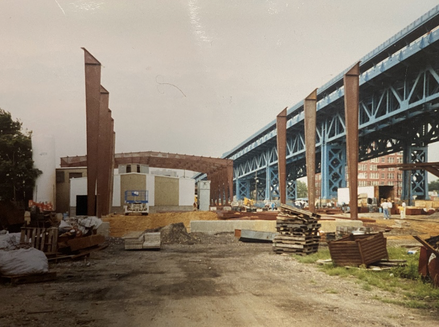
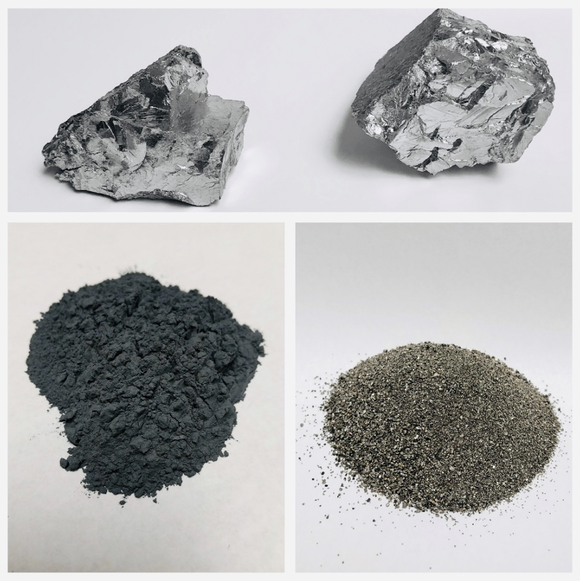
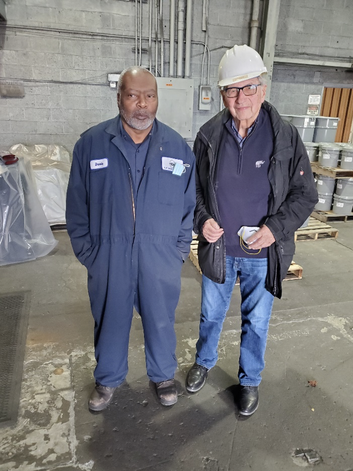
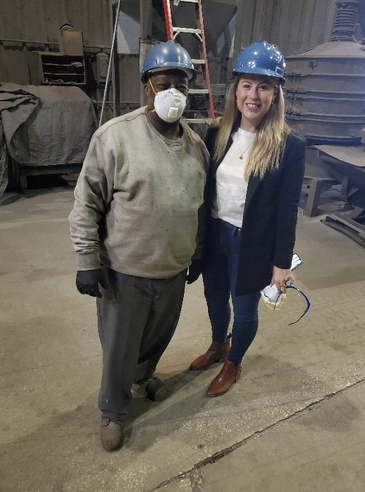
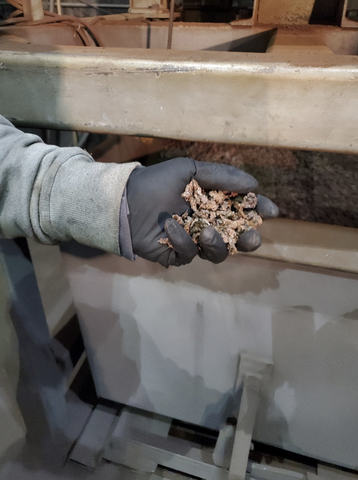
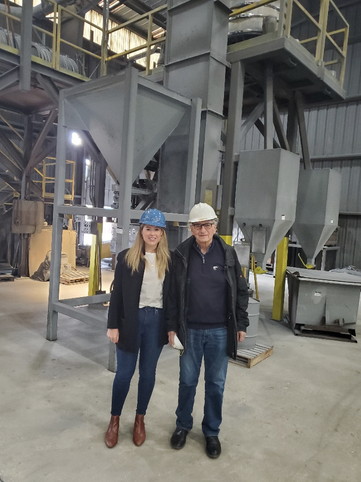
 RSS Feed
RSS Feed